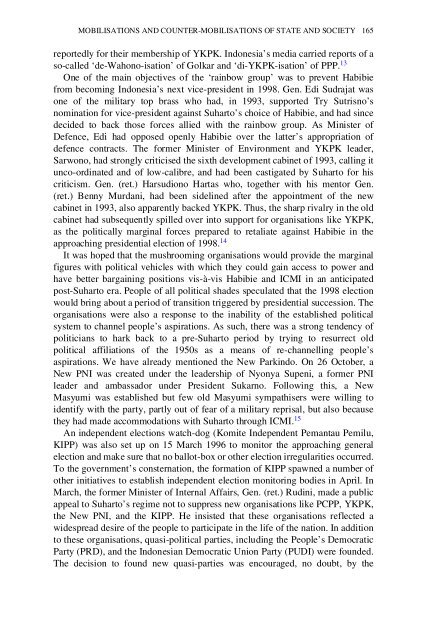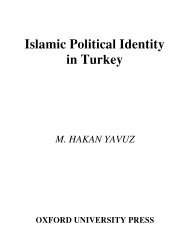Create successful ePaper yourself
Turn your PDF publications into a flip-book with our unique Google optimized e-Paper software.
MOBILISATIONS AND COUNTER-MOBILISATIONS OF STATE AND SOCIETY 165reportedly for their membership of YKPK. <strong>Indonesia</strong>’s media carried reports of aso-called ‘de-Wahono-isation’ of Golkar <strong>and</strong> ‘di-YKPK-isation’ of PPP. 13One of the ma<strong>in</strong> objectives of the ‘ra<strong>in</strong>bow group’ was to prevent Habibiefrom becom<strong>in</strong>g <strong>Indonesia</strong>’s next vice-president <strong>in</strong> 1998. Gen. Edi Sudrajat wasone of the military top brass who had, <strong>in</strong> 1993, supported Try Sutrisno’snom<strong>in</strong>ation for vice-president aga<strong>in</strong>st Suharto’s choice of Habibie, <strong>and</strong> had s<strong>in</strong>cedecided to back those forces allied with the ra<strong>in</strong>bow group. As M<strong>in</strong>ister ofDefence, Edi had opposed openly Habibie over the latter’s appropriation ofdefence contracts. The former M<strong>in</strong>ister of Environment <strong>and</strong> YKPK leader,Sarwono, had strongly criticised the sixth development cab<strong>in</strong>et of 1993, call<strong>in</strong>g itunco-ord<strong>in</strong>ated <strong>and</strong> of low-calibre, <strong>and</strong> had been castigated by Suharto for hiscriticism. Gen. (ret.) Harsudiono Hartas who, together with his mentor Gen.(ret.) Benny Murdani, had been sidel<strong>in</strong>ed after the appo<strong>in</strong>tment of the newcab<strong>in</strong>et <strong>in</strong> 1993, also apparently backed YKPK. Thus, the sharp rivalry <strong>in</strong> the oldcab<strong>in</strong>et had subsequently spilled over <strong>in</strong>to support for organisations like YKPK,as the politically marg<strong>in</strong>al forces prepared to retaliate aga<strong>in</strong>st Habibie <strong>in</strong> theapproach<strong>in</strong>g presidential election of 1998. 14It was hoped that the mushroom<strong>in</strong>g organisations would provide the marg<strong>in</strong>alfigures with political vehicles with which they could ga<strong>in</strong> access to power <strong>and</strong>have better barga<strong>in</strong><strong>in</strong>g positions vis-à-vis Habibie <strong>and</strong> ICMI <strong>in</strong> an anticipatedpost-Suharto era. People of all political shades speculated that the 1998 electionwould br<strong>in</strong>g about a period of transition triggered by presidential succession. Theorganisations were also a response to the <strong>in</strong>ability of the established politicalsystem to channel people’s aspirations. As such, there was a strong tendency ofpoliticians to hark back to a pre-Suharto period by try<strong>in</strong>g to resurrect oldpolitical affiliations of the 1950s as a means of re-channell<strong>in</strong>g people’saspirations. We have already mentioned the New Park<strong>in</strong>do. On 26 October, aNew PNI was created under the leadership of Nyonya Supeni, a former PNIleader <strong>and</strong> ambassador under President Sukarno. Follow<strong>in</strong>g this, a NewMasyumi was established but few old Masyumi sympathisers were will<strong>in</strong>g toidentify with the party, partly out of fear of a military reprisal, but also becausethey had made accommodations with Suharto through ICMI. 15An <strong>in</strong>dependent elections watch-dog (Komite Independent Pemantau Pemilu,KIPP) was also set up on 15 March 1996 to monitor the approach<strong>in</strong>g generalelection <strong>and</strong> make sure that no ballot-box or other election irregularities occurred.To the government’s consternation, the formation of KIPP spawned a number ofother <strong>in</strong>itiatives to establish <strong>in</strong>dependent election monitor<strong>in</strong>g bodies <strong>in</strong> April. InMarch, the former M<strong>in</strong>ister of Internal Affairs, Gen. (ret.) Rud<strong>in</strong>i, made a publicappeal to Suharto’s regime not to suppress new organisations like PCPP, YKPK,the New PNI, <strong>and</strong> the KIPP. He <strong>in</strong>sisted that these organisations reflected awidespread desire of the people to participate <strong>in</strong> the life of the nation. In additionto these organisations, quasi-political parties, <strong>in</strong>clud<strong>in</strong>g the People’s DemocraticParty (PRD), <strong>and</strong> the <strong>Indonesia</strong>n Democratic Union Party (PUDI) were founded.The decision to found new quasi-parties was encouraged, no doubt, by the




